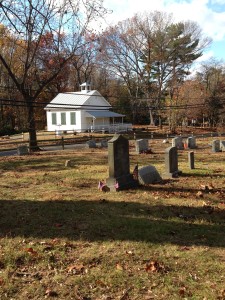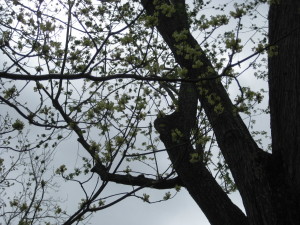May this Veterans’ Day be a reminder to thank, honor and remember the heroes who fought for our country, for our freedom, and for our strength. Help us to be grateful, every day, for all that they have done, for all that they have given. May we find meaningful ways to show our appreciation. Help us to treat our returning veterans with the respect, care and generosity they deserve, so that their wounds might heal. May God bless these brave men and women and their families. May God bless the U.S.A.
Category Archives: Faith and Spirituality
Underfoot, and Easily Overlooked, the Circle of Life
Yesterday, my daughter called my attention to an elaborate lichen formation on one of the decaying tree stumps in our front yard. Although I walk past it nearly every day with Kiko, I hadn’t noticed it. Amazing, the strange beauty we can so easily overlook. Our lawn repeatedly offers such spectacles. Yet I still forget. Oblivious, I walk right by.
I’ve written about the attachment our family feels toward our old trees. (See The Silver Maples Say Welcome Home, April 2012, and Barred Owl Update, June 2013.) The two immense maples that survive from the original six, planted the year our house was built, are ninety-three years old. Broad stumps serve as place markers, memorials for the trees that had to be removed. The life, so strikingly peculiar, that emerges from these dead stumps is further justification for our not having them ground down.
Lichen is one of earth’s oldest life forms. Very slowly, but with exceptional persistence, it emerges in unlikely, inhospitable spots, nearly impervious to extreme conditions and temperatures. In the crowded busyness of our twenty-first century world, it keeps a low profile and may go unnoticed. Lichen is not a single organism, but a complex partnership between fungi and algae. Lichen may grow from bare rock or wood. As it grows, it breaks down the substance from which it emerges, helping to create soil.
The lichen on our tree stump is a cascade of flower-like growths. Depending on your point of view, it resembles part of an exuberantly ruffled blouse, rippling water flowing over rocks, the feathered plumage of a giant bird, the petals of cabbage roses deconstructed and rearranged, or even the scales of a fantastic crocodilian creature.
I’m so glad we let nature take its course. Had we not said “no,” over and over, to unbeatable stump grinding prices (offered eagerly by every tree company that drives past the house), we would have no stage for this riot of oddly lovely new life. How satisfying, how hope-inspiring, it is that from the last vestiges of this maple tree springs an ancient vitality. Decay and growth, hand in hand, rather like the lichen partnership itself. The circle of life, circling on and on, underfoot. While the tree stump remains, we’ll be observers at the quietly fabulous end-time celebration it’s hosting.
Party on, lichen.
Lessons from Vacation Bible School, Part II
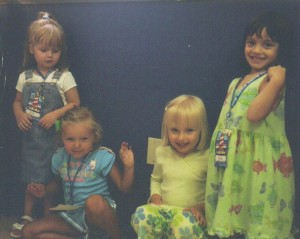
I retired from Crafts and led Bible Adventures for the next two summers. The following year, when previous VBS directors had had enough, I agreed to lead the entire program. I’ve done so for nine years now. I may be starting to get the hang of it. At least I’ve learned some valuable lessons.
My first few years as VBS director were rough. I was reluctant to ask for help. I didn’t want to inconvenience anyone, so I tried to do too much. I was hesitant to schedule planning meetings, knowing that every church volunteer has too many such events already glaring out from their calendars. I often awoke around 4 AM, worried that I couldn’t get it all done, uncertain what “it” was. I got angry and tired because I didn’t have the help I needed. It was a vicious circle, and it wasn’t doing anything for my spiritual well-being, or for anyone else’s.
I was anxious over every bump in the road. And there were, are, and always will be bumps. What if I can’t find a preschool leader? What if I can’t get enough volunteers to provide meals? (Our VBS is held in the evenings, and we begin with a light supper each night.) When would I find time to buy all the necessary items for Crafts? Where are the robes we’ll need for Bible Adventures? Will I be able to locate the place where I can pick up dry ice? (VBS typically requires many odd props.) What if very few children participate? Or what if there are way too many, far more than we can handle?
I fretted about the task of organizing the children into the crews in which they rotate from one activity to the next. There are many subtleties to consider: these two siblings must be together; these cannot be together; this child doesn’t get along with that one; these two get along too well and will conspire to create chaos; these four cousins want to be in the same crew; this kid wants to be in a group led by his older sister, but the sister needs a break from her brother, etc. Then there are those difficult children whose strong personalities overshadow those of their peers. And each year there are some children I’ve never met. Are they painfully meek, or boisterously gregarious? On the afternoon that VBS begins, I have devised neat lists of kids, organized into apparently cohesive groups. An hour later, with the walk-ins and the no-shows, my carefully considered groupings are shuffled unrecognizably, turned upside down. This problem will always be with us. It’s not improved by my worrying about it.
Gradually, I began to let go of more worries. Every year in VBS, we tell the kids about the power of prayer: Don’t worry about anything. Instead, pray about everything (Philippians 4:6). The message finally got through to me, too. I started turning my worries into prayers. Before long, I was hearing an answer: ask for help. Evidently I had somehow managed to give the impression that I had everything well under control. Once word got out that this was completely false, offers came rolling in. Some were from people who had no desire to be surrounded by a mob of children; they realized they could contribute in other valuable ways. One volunteer, who has a gift for composing, editing and polishing text, had the idea to publish a Wish List in the church bulletin and newsletter that spelled out our needs, both supplies and personnel. The Wish List, and the gracious generosity of our church family, allow me to go on vacation immediately before VBS and know that progress is ongoing; my vigilant and efficient friend is minding the store. I found that, if asked, a surprising number of people are glad to be of assistance. It helps immensely that our current minister, who knows how to rally the congregation, is our VBS head cheerleader. Each year, more people get involved, resulting in less work and greater camaraderie for all.
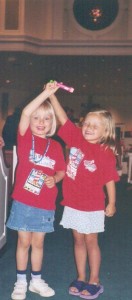
For the past several years, we’ve been fortunate to have the right volunteers for every job. Our music leader, a talented singer-songwriter and versatile instrumentalist, is enthusiastic and easy-going. He has helped me realize that we shouldn’t expect perfection, from ourselves or from the children. He reminds me that when something goes wrong, as long as no one is injured, it’s usually not a big deal. In Crafts, thankfully, we have creative leaders who take the messiness in stride and manage to enjoy the kids. Heading up Games is a dynamic young woman I watched grow up in the church. She possesses boundless energy and a formidable sense of dedication. Leading the video-discussion segment is a husband and wife team skilled in engaging the kids without condescension. My daughter recruits a few buddies, and they handle Bible Adventures with imagination and a sense of fun. D shoulders more responsibility every year; she has become my assistant director. She excels at the tasks I find most difficult, and she knows the ropes, having lived and breathed VBS every August for as long as she can remember. Our preschool leaders are caring, calm and unflappable; serenity reigns in their classroom. I no longer have to worry about arranging meals; this burden is shouldered reassuringly by a well-organized friend. We couldn’t pull off VBS without our youth; they bring their friends and shepherd the kids from one rotation to the next. Due to all these many considerate and capable volunteers, my job has become pleasant, even rewarding.
After all these years, it’s begun to make sense to me: an important aspect of VBS is building community. There is no glory in going it alone, beaten down by worry. It’s about working together, guided by prayer, in a spirit of optimism and generosity. When we combine our unique talents and pool our resources, that crucial VBS message resounds further and remains resonant far longer: Jesus loves you so much!
Lessons from Vacation Bible School, Part I
My earliest church memory may be of Vacation Bible School. It’s a vague, but agreeable recollection: I’m about three years old, sitting with several other children in miniature wooden Sunday School chairs. A sweet-faced elderly lady tells Bible stories. We have juice and cookies. There’s an old piano, and we learn the Zaccheus song: Jesus said, Zaccheus you come down, for I’m going to your house today. We finish with “Jesus Loves Me.” As I recall, I was content to be there in the little stone Methodist church in the Kentucky town where my grandparents lived.
Back then, it was just Bible School, not yet routinely prefaced by “Vacation,” not yet shortened to VBS. It wasn’t slickly packaged or corporate. But the essential message, then and now, is the same: Jesus does, indeed love you.
This is a message I wanted my daughter to hear from others besides me and her immediate family. I wanted Vacation Bible School to be woven into the fabric of her early life, just as it had been for me. She first attended when she was two and a half. We had found our church home, and she would be starting preschool there in the fall. VBS was her first taste of being away from me, in a group of her peers, for a short time.
My daughter and I have both come a long way since then. D, of course, has grown from toddler to teen, from plump baby to willowy young woman. During her initial VBS, she was a somewhat reluctant participant in the preschool group, one who would rather not leave her Mama. Now she and her friends lead Bible Adventures. As for me, back then I helped lead Crafts, and I was youngish. Now, as the mother of a high schooler, I’m closing in on oldish. I have, however, become somewhat wiser. I’ve learned a few things from all my years of VBS.
First, I learned that I don’t like leading Crafts. It took me two years to realize that this was not my niche. One night I was standing by, trying to assist, as a child locked a bottle of white school glue in a death grip. Glue puddled on the construction paper, on the table, on the boy’s hands. Still he kept squeezing, resisting my helpful advice: That’s enough glue! Once the bottle was nearly empty, and as though in utter surprise, he began to wail, “Too much glue!” Yeah. No kidding.
I hate leading crafts, I thought. I hate the excesses of glue and glitter. I hate trying to organize the multi-piece, pre-cut foam assemblages, each small segment (moon-faced child, smiling sun) individually wrapped in cellophane. Certain pieces tended to vanish, causing great distress among the kids: I need a red bird! Where’s my purple dress? Did you take it? The Crafts experience, under my leadership, didn’t seem to be furthering the “Jesus loves you” message. At the end of each sticky, messy, frustrating evening, I wanted to run away and never return. I wanted to be far from any church, far from all children, far from everyone.

But on the final night, I remembered why we were there. H and I got to see our tiny girl standing at the front of the sanctuary with all the other children, singing the songs they learned during the week. Even before I became a mother, I’ve been a sucker for kids singing in church. Watching our daughter participating with the group made it magical. She looked like an angel. It was for moments like this that I had always wanted to be a parent.
Then a minor tragedy occurred. In Crafts (and under my purview), the kids had made shakers for use during the final musical program. We had filled paper plates with small pieces of gravel and stapled them together. D was brandishing her shaker enthusiastically when a staple or two gave way. Chunks of gravel and a cloud of dust exploded all over the choir loft. D burst into tears and bolted, screaming, searching frantically for me in the pews.
Another thing I learned that year was this: don’t use gravel to make shakers. The instructions in the Crafts leader guide need not (and should not, in certain cases), be followed to the letter. I would give this advice to a future Crafts leader. Next year, I would find a better fit, and I would go on to learn more important lessons.
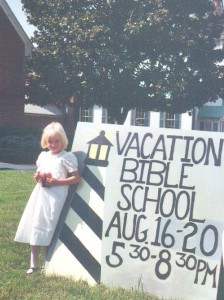
Prayers for Boston, Prayers for our Country
It’s happened again. Another harrowing national tragedy. This time in Boston, during that city’s much-beloved marathon, on Massachusetts’ annual Patriot’s Day, a day of holiday and celebration.
More innocent lives were lost yesterday, April 15. More bodies were maimed, more souls damaged, more children left without a parent, more parents’ lives ravaged by the loss of a child. Another beautiful day in April, forever marked by catastrophe and sadness. Today is the six-year anniversary of the Virginia Tech shooting. This Friday, 18 years will have passed since the Oklahoma City bombing. As in the 1996 bombing at the Atlanta Olympics, a jubilant time in the life of a city has been twisted into ugliness, a blood-red-letter day of mourning. As in December’s horrific mass shooting in Newtown, Connecticut, children are among the victims. As on all these days and on September 11, those of us still standing are shakier, less steady.
Perhaps somewhat guiltily, we are relieved that it wasn’t our time. Not yet, at least. But we know it could easily have been us. It could happen to any of us. And increasingly often, it does. Our family was concerned, in particular, about friends from our church. The daughter was running the marathon, and her parents were there to cheer her on. Luckily, she is young, strong and very fast. We learned through Facebook that the family was unhurt physically.
Now, as a nation, we will pause. We will mourn. Many of us will pray. We may find ourselves at a loss for how to proceed. But then, as we always do after such calamities, we will rally. We will come together in love and support of those who died, of those runners now missing limbs, of those who have lost loved ones, of those who will assist friends and family as they face years of surgery and difficult recovery. We will stand up and say that we refuse to get used to this. We refuse to accept such violence as the natural order of things. And through our shared strength and determination, we will show that no matter what, the power of goodness will win out over evil. Immediate proof of this is demonstrated by the many people who stepped in, selflessly and heroically, to do everything they could to help injured strangers.
My prayers will continue to go out for all those impacted by this tragedy, and for all Bostonians, who, I would imagine, take personally this despicable strike against their hometown.
Happy Easter!
Good Friday: It Is Finished. Let Life Begin.
Charles Wesley eloquently summed up the message of Good Friday in the words of the following hymn, which he composed in 1762.
Its title comes from the last words of Christ from the cross,
as told in John 19:30: It is finished.
‘Tis Finished! The Messiah Dies
Tis finished! the Messiah dies, cut off for sins, but not his own.
Accomplished is the sacrifice, the great redeeming work is done.
The veil is rent; in Christ alone the living way to heaven is seen;
The middle wall is broken down, and all the world may enter in.
‘Tis finished! All my guilt and pain, I want no sacrifice beside;
for me the Lamb is slain, ’tis finished! I am justified.
The reign of sin and death is o’er, and all may live from sin set free;
Satan hath lost his mortal power, ’tis swallowed up in victory.
Kiko’s Close Call
Fortunately Grandma heard Grandpa yell and was alerted to the situation. I had showed her Kiko’s bag of treats and left them out on the table. Thinking quickly, she got a treat and rushed out in pursuit. By this time Grandpa and the dog were well down the road. Kiko would stop occasionally and look back, then fly off again playfully. He was evidently thinking, This is a great game!. When he heard Grandma yell pleasantly, Kiko, treat!, he paused long enough to allow Grandpa to catch up and grab his collar. Luckily, I hadn’t removed the collar as I usually do at home; this dog is as slippery as an otter. Kiko was saddened and stunned to see the game ending so quickly, and he did all he could to resist returning home. He splayed his legs, put his head down resolutely, and managed to make his compact 26-pound bulk feel much heavier. But Grandpa was determined, and mustering his strength, he corraled our little runaway beast.
Considering that Grandpa and Grandma generally don’t move especially fast, it is a near-miracle that they managed to catch our speedy dog. Evidently the adrenaline rush fueled their unusual alacrity. The real miracle, according to Grandpa, was the absence of a single car passing by during the entire episode.
We all visualized various grim alternate endings: Grandpa collapses in the street with a heart attack, Grandma slips on the icy road and breaks a hip, and Kiko is still flattened by a Suburban.
We would all be awash in blame. The whys and the what-ifs would be dizzying and relentless. Why didn’t we ask Grandma and Grandpa if they planned to go out? Why didn’t we warn them about the garage door? What if we had taken Kiko with us? Grandpa would regret that car wash for the rest of his life, as H, D and I would regret that day’s outing.
Here, I am, close to tears, again, imagining the sad trip back to Virginia, without Kiko. Or with his inert little body packed in ice in the back of the car? I doubt we could have buried him in the frozen Rochester ground. We would have had to gather up all his stuff–his bed, blanket, food bowls, treats, Foxy, his little coat. Oh, his little plaid coat, the coat he wore only once! And now my heart is breaking for parents who have lost children (and I do mean human children) who must confront the tormenting evidence–the forlorn toys, the clothes, the snow boots–that screams: She’ll be back! She’s at a friend’s house. He’ll be home from school at 4:00! How do such parents answer, without going insane: No, pretty red dress, my baby won’t be home again. No, boots, he will not use you for this snow, or ever. Only with God’s help.
But our ending, this time, was a happy one. I don’t think God held back the cars that day. Nor do I think he assigns guardian angels to dogs. But maybe God did give Grandpa and Grandma the unaccustomed speed they needed to catch our escaped monster. And maybe he looked after them so they did not get hurt in the process. Maybe he helped Grandma remember that a treat might work magic. And maybe luck was simply on our side.
Today, safely at home, my Kiko is warm in the sun. I will cuddle him, and give thanks again. And I will say a prayer for those wrestling with an unhappy ending.
Kiko sleeps in the March sun.
Now Grandma and Grandpa have signs like this one on all their doors, just as we do in our house.
Ashes to Ashes
On Ash Wednesday, we are urged to face a stark truth: we will not live forever. The certainty of our mortality should be evident as we daily confront our society’s latest egregious incidents of violent fatality. Where was today’s shooting? At a mall, an office, a restaurant, a church, or, most horrifically, at a school? Who were the heroes and innocents who died senselessly this week? Firefighters, doctors, nurses, teachers, small children, infants? Depending upon where you live, you may be mourning a different tragedy than the one that preys on my mind. There are so many tragedies in our world. Every day it becomes more difficult to say It can’t happen in my neighborhood.
Yet despite the ongoing exposure to such dire events, our culture is constantly blaring the message that if we spend enough on miraculous health and beauty products, if we make the right lifestyle choices, we can prolong our lives indefinitely. It promises us, repeatedly, that it’s in our best interests to extend the look of youth far beyond our youthful years. One of the worst things we can say about a celebrity is this: She’s looking her age. How shocking! How pitiful! Not enough botox, or botox gone bad. Excessive collagen, or inadequate collogen. A facelift that failed. A fanatical exercise regime that no longer does the trick. Her arms were once buff; now they’re stringy. The more beautiful one is in youth, the sadder seems the diminishing of that beauty with age.
Yesterday I caught a brief snippet of a TV soap opera that I admit I used to watch, on occasion. Well, not really watch. It happened to come on at a time when I needed a rest. It offered a distraction as I sat down to fold laundry, leaf through piles of papers and magazines for recycling, make get-well cards. Sometimes it lulled me to sleep, I have to say. This particular soap opera, even sillier than most, if possible, requires minimal attention, because it’s always the same. During my most recent viewing, it was immediately apparent that the same small group of characters was still soldiering on in scandalous banality, divorcing, remarrying, swapping spouses and children, re-betraying one another in bizarre ways. At a glance, the old gang looked very much the same. There was not a wrinkle, not a gray hair to be seen. Bodies were svelte, as always. But the faces were altered in odd ways: eyes slanted at more extreme angles, lips overly puffy, cheekbones higher, chins more pronounced, foreheads immovable as those of marble statues. The characters continue to behave in sophomoric, stupid ways, so it is fitting, perhaps, that they appear young.
In real life, though, is maturity so terrible? If we learn from our mistakes, we are not cursed to repeat them endlessly, like soap opera characters. As we mature mentally and spiritually, we will age, and our age will show.
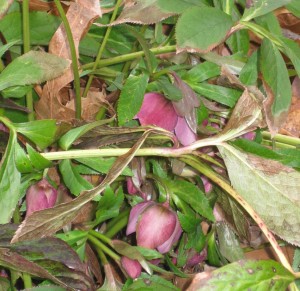
I’m not saying I’m immune to the horror of growing old. I’ve begun to avoid harsh lighting, I’ve noted, with acute dismay, what an awkward turn of my head can do for the skin on my neck. The magnifying mirror is my frenemy. I silently bewail the effects of gravity. Just as the classic birthday card line attests: Old age is not for sissies. It’s for the the wise, the well-adjusted, the truly mature.
On Ash Wednesday, we are called to confront the fact that no magic potion or surgery will keep old age forever at bay. And while death claims the young, as we see all too often, most of us are granted the bittersweet privilege of aging in this lifetime. This is, indeed, a gift; it allows us the opportunity to grow toward wisdom, toward maturity. It means the chance to come to terms with the hollowness of our culture of vanity, and to learn to live accordingly. The visible effects of age are reminders that death awaits us, unavoidably. The physical body decays even as we live, earthly beauty is fleeting, and material possessions are transitory. Once we acknowledge these truths, we are free to recognize the real value of what will not pass away:
And now, these three abide: faith, hope and love. But the greatest of these is love. –1 Corinthians 13: 13
On Ash Wednesday, we thank God for not leaving us to eternal decay. Through the love of Jesus Christ we are rescued from the dust, from perpetual darkness. Our future, as God’s beloved children, is one of light and glory, of joyful wisdom that, in its zeal, perfection, and yes, its maturity, will remain forever young, forever beautiful.

*************************************************
For further discussion of the meaning of Ash Wednesday, see last year’s post: What’s with the Ashes?, February 22, 2012.
Moving On, Into a New Year
This is the dreaded week of my Christmas clean-up. I began the day by wandering remorsefully through the house, wishing we hadn’t put up six trees, wondering where to start the process of un-decoration. As always, I will resolve this year, for a change, to find the right boxes for the packing-up. When I can’t manage that, I will vow to locate an actual working marker to label the boxes. When even that proves undoable, I will tell myself that I’ll remember what I put where. Eleven months from now, I will be standing in our frigid attic, muddled and confused. The box that professes to contain miniature trees will be full of stockings and bead garlands. Where did the box of white lights go this time? Some crucial item, usually one of our star tree-toppers, will have vanished completely.
But it’s a new year, and it’s time to move on. The trappings of the holiday season have undergone an unmistakable, unsavory shift in essence. Five weeks ago, they were the stuff of joy and hope. Now they are clutter. The blue spruce is droopy and dry, its needles as sharp as steel.
I look forward, past the mess, envisioning the uncluttered, restful simplicity of mid-January. It’s an illusion, a vanishing mirage, of course. With a vengeance, this first month bursts with the business of everyday life. A glance at the calendar reveals an exhausting proliferation of church meetings, school volunteer meetings and appointments with doctors. All that and all the Christmas debris, still here.
Yet the reality of the new year brings a clearer, if starker, light. It gladdens my heart to think that the shortest, darkest day of the year has come and gone. The earth is turning, tilting toward spring. The leaves of the rhododendrons in our back garden shrivel in the cold, but their blooms are set, ready and waiting. Nature’s optimism and foresight promises renewal. It really is time to move on.
A rhododendron bud stands by for spring.

